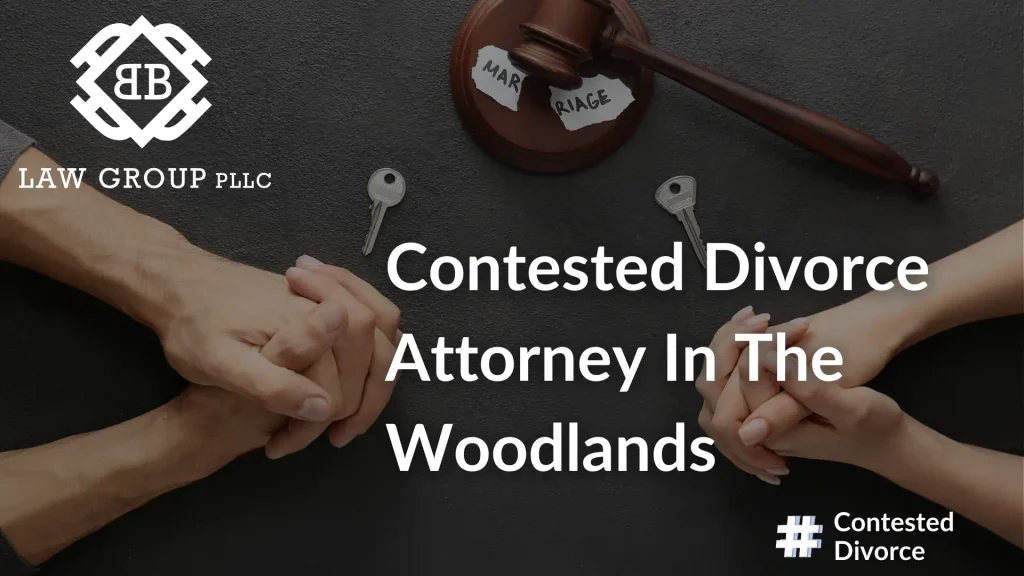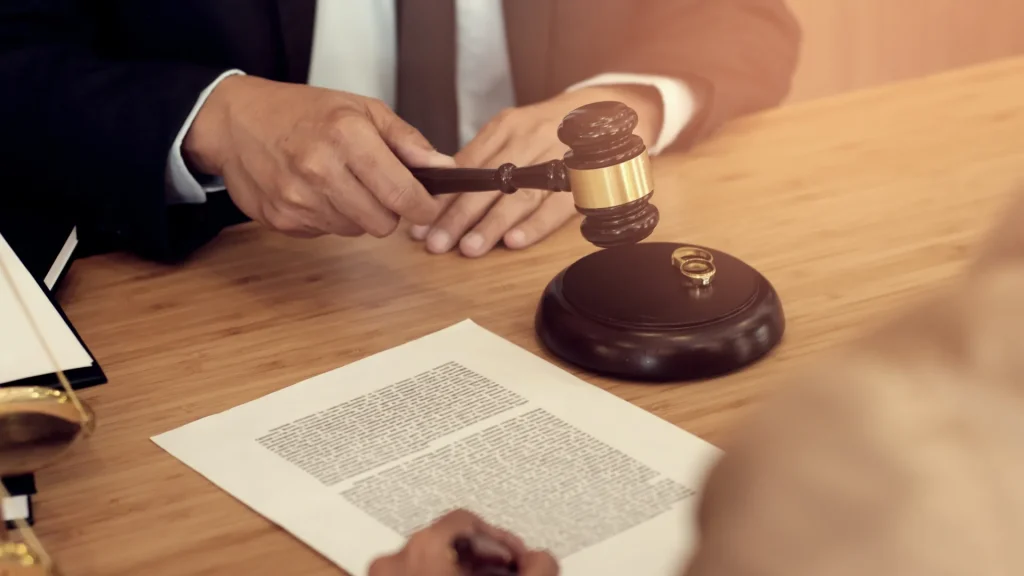 Over half of marriages in the U.S. end in divorce now and about 90% of them are classified as uncontested divorces, in which spouses agree on the terms without issue. Contested divorce is nearly 10% of all divorces that occur when spouses are simply unable to agree on settlement terms. In such a situation, you need someone to actively represent and protect your interests. That is why the experienced and aggressive The Woodlands area divorce attorneys at BB Law Group PLLC are here to help.
Over half of marriages in the U.S. end in divorce now and about 90% of them are classified as uncontested divorces, in which spouses agree on the terms without issue. Contested divorce is nearly 10% of all divorces that occur when spouses are simply unable to agree on settlement terms. In such a situation, you need someone to actively represent and protect your interests. That is why the experienced and aggressive The Woodlands area divorce attorneys at BB Law Group PLLC are here to help.
With years of experience representing divorcing parties in Woodlands, the attorneys at BB Law Group PLLC know how contentious divorces can quickly become. Our skilled attorneys negotiate and mediate effectively, applying pragmatism during times when you may feel highly emotional and volatile due to the nature of your case. Knowing how to proceed with the complicated realities of divorce can be confusing. You must make many decisions that will have short- and long-term consequences for your life. Having an experienced attorney from BB Law Group PLLC who can vigorously represent your interests throughout the divorce process is incredibly important so that you get what you are entitled to in the proceedings.
When you cannot agree to divorce terms with your spouse, it’s easy to become frustrated and overwhelmed with the divorce process. However, with the help of a qualified attorney, you can fight for your interests in your divorce and increase your chances of getting the terms that you want. The Woodlands contested divorce lawyers of BB Law Group PLLC are committed to helping clients fight for the divorce settlement terms that will best suit them, and you can learn more about our legal services today by calling (832) 534-2589, filling out a contact form, or by chatting with us live.
Contested Divorces
In an uncontested divorce, the involved parties generally agree to both get divorced and on the terms of their divorce. However, they might disagree about wanting to get divorced or about specific divorce terms, such as asset division, alimony, child custody, and child support.
When the divorcing couple cannot agree on matters, they generally face greater costs and longer timeframes to get divorced compared to an uncontested divorce. The process for a contested divorce consists of the following elements:
- The spouse seeking a divorce will file an Original Petition for Divorce with the court that specifies on what grounds they are seeking a divorce, what they are requesting from the court, and any temporary orders (such as restraining orders) that the court needs to address.
- The court will review the paperwork and serve the other spouse with the Petition for Divorce.
- The other spouse will have 20 days to file an answer to the original petition. The responding spouse will likely dispute any allegations made against them. Additionally, they may file a counterpetition against the spouse who originally filed the paperwork
- In the majority of counties in Texas, the court will require or strongly recommend that the parties try to mediate their dispute and come to a settlement before taking it to trial. This is especially so when the court expects an issue to take more than three hours of its time. A third-party mediator, unaffiliated with either party, will conduct the mediation.
- If the parties cannot agree on a settlement during mediation, the divorce will go to trial, which can take weeks or, in some cases, even years to conclude.
When a divorce is particularly contentious, it is critical to have an experienced divorce attorney on your side to protect your rights and help you keep what matters to you the most.
Commonly Disputed Issues
Divorces are typically different for everyone, but many issues arise again and again in contested divorces. Many spouses have difficulty agreeing over the following issues:
Types of Divorces:
- Property Division: In the state of Texas, both spouses jointly own all property acquired during their marriage, since it is a community property state. However, some things remain the separate property of a married spouse. The distinction between community property and separate property can be quite unclear in certain cases. This can have significant consequences for both parties when they are dividing their assets. Dividing property can complicate the divorce process. In an uncontested divorce, the involved parties usually agree to the divorce and its terms. Divorce disagreements can be about wanting to divorce or specific terms like asset division, alimony, child custody, and support. It involves several aspects, such as the appraisal of items like business valuations and art valuations by an expert. Hiring a lawyer who understands property definition and division can significantly impact the long-lasting implications of your divorce settlement.
- Allocation of Debt: Spouses often dispute over debt responsibility, especially when one spouse benefits more from the debt acquired during the marriage. Examples of this would include one spouse going back to school, or one spouse starting a business
- Child Custody/Visitation: In Texas, the courts prefer joint custody of children, but it is not always in the child’s best interest. A court may deviate from that preference if necessary, and a spouse can bring the issue before a judge if they feel the other parent is unfit.
- Child Support Payments: A parent may refuse to pay child support despite being legally responsible, depending on the custody agreement. Additionally, a parent may want to use a child as leverage in negotiating the terms of a divorce settlement. When dealing with thorny elements of contested divorce proceedings, having a lawyer can help balance the power dynamic.
- Alimony Payments: In Texas, there are two types of alimony: contractual alimony, which the parties agree upon and is unlikely in a contested divorce scenario, and court-ordered spousal maintenance. In some instances a court can make a spouse involuntarily pay spousal maintenance, allowing the receiving spouse to regain their independence. To receive court-ordered spousal maintenance, the issues must go before a judge.
- Paternity Issues: A party may try to avoid paying child support by claiming a child is not theirs. A court can help solve this problem by ordering DNA tests to determine paternity.
At BB Law Group PLLC, we recognize that going through a contested divorce can be a long and tedious process, filled with efforts of manipulation, intimidation, and overreaching. Having skilled representation from an experienced Woodlands contested divorce attorney from BB Law Group PLLC can be highly beneficial to the outcome of your case. An attorney can negotiate on your behalf during divorce, reducing stress.
Contact Us
Whatever issue is plaguing your divorce and making it hard to complete the process, The Woodlands divorce lawyers of BB Law Group PLLC are here to help. Our attorneys are skilled in negotiating, mediation, and litigation, representing you in court proceedings. Woodlands contested divorce attorneys at BB Law Group PLLC will fight to ensure that your rights are preserved and you are awarded what you deserve. To learn more about how we can help you through your contested divorce, please give us a call at (832) 534-2589.
